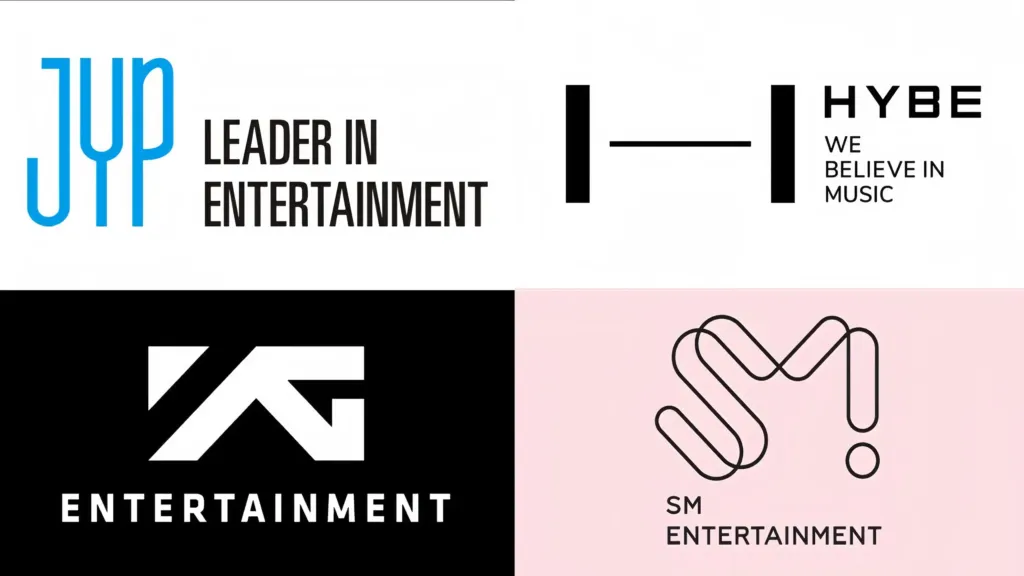K-pop is more than just music and choreography — it is a form of performing art that blends stage technology with each company’s unique identity. The “Big Four” — YG, SM, JYP, and HYBE — have each shaped the industry across multiple generations of idols. But who truly deserves the title of “King of the K-pop Stage”?

YG Entertainment
Founded: 1996, by Yang Hyun-suk (former member of Seo Taiji and Boys).
YG stands out for its hip-hop and street-inspired direction, emphasizing individuality and charisma over strict synchronization. Its “power” comes from heavy beats, sharp choreography, and confident, commanding performances. Its “freedom” lies in how artists improvise on stage — from ad-libs and freestyle rap to spontaneous interactions with the audience.
Notable groups:
- BIGBANG — pioneers who revolutionized idol performances with a “rockstar” aura.
- BLACKPINK — global icons known for charisma, fashion, and stadium-commanding presence.
- iKON — celebrated for explosive energy, especially at festival stages.
- WINNER — approachable yet stylish, blending individuality with entertainment.
- TREASURE — YG’s new generation, merging hip-hop roots with global trends.
SM Entertainment
Founded: 1995, by Lee Soo-man.
SM is regarded as the master of precision and synchronization. Its strengths include:
- Technology & concept: pioneers in integrating lighting effects, AR, VR, and building “artistic universes” for groups, creating unique stage experiences.
- Music & choreography: rigorous training with highly synchronized dance, every move calculated to perfection.
- Performance design: large-scale productions staged like cinematic showcases rather than simple concerts.
Notable groups:
- TVXQ — first-generation legends, famed for powerful choreography and live vocals.
- Girls’ Generation (SNSD) — second-generation icons of elegance and synchronization.
- EXO — distinguished by precise choreography and a unique “superpower” concept.
- Red Velvet — celebrated for genre diversity and artistic stagecraft.
- NCT — an open project with multiple sub-units, offering varied performance styles.
- aespa — pioneers in blending AI and the “metaverse” into live stages.
JYP Entertainment
Founded: 1997, by Park Jin-young (singer, songwriter, producer).
JYP nurtures artists with a friendly, relatable image, making audiences feel connected even on the biggest stages. Its strength lies in breaking barriers with fans, creating an atmosphere of “idols of the people.”
The music is catchy, paired with energetic, dynamic choreography often tied to viral highlights. Performances radiate joy, fun, and positivity, easily drawing audiences in.
Notable groups:
- Wonder Girls — trailblazers who brought K-pop to the global stage with “Nobody.”
- 2PM — known as “beast idols” for their strong, charismatic performances.
- GOT7 — debuted under JYP, recognized for diverse styles and strong fan interaction (departed JYP in 2021).
- TWICE — global girl group, loved for bright and lively performances.
- Stray Kids — new generation, self-producing music with powerful choreography.
- ITZY — pursuing the “girl-crush” concept with bold dance and empowering messages.
- NMIXX — experimenting with genre-blending music and versatile stage performances.
HYBE (Big Hit)
Founded: 2005, by Bang Si-hyuk.
HYBE is known for turning each performance into a piece of storytelling art, blending music, concept, and visuals to evoke deep emotions. Its strength lies in balancing artistry with meaningful messages, allowing audiences to not only watch and listen but also connect with the values behind each stage.
Notable groups:
- BTS — global icons, renowned for powerful messages and emotional resonance on stage.
- SEVENTEEN (under Pledis, a HYBE subsidiary) — acclaimed for flawless synchronization and self-choreography.
- TXT (Tomorrow X Together) — continuing the tradition of cinematic, story-driven performances.
- ENHYPEN (under Belift Lab) — noted for dark fantasy concepts and impactful staging.
- LE SSERAFIM — strong, confident performances with a bold identity.
Who Is the “King of the K-pop Stage”?
In K-pop, each company follows a different philosophy in music, choreography, and performance. There is no single “absolute leader,” as each contributes uniquely to the industry:
- YG: charisma, individuality, and explosive spontaneity.
- SM: discipline, synchronization, and cutting-edge stage technology.
- JYP: warmth, fun, and strong audience connection.
- HYBE: emotional storytelling and meaningful artistry.